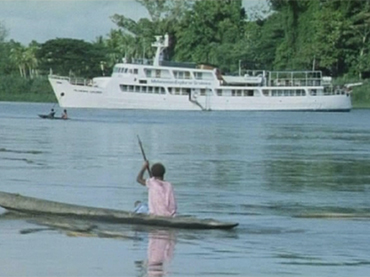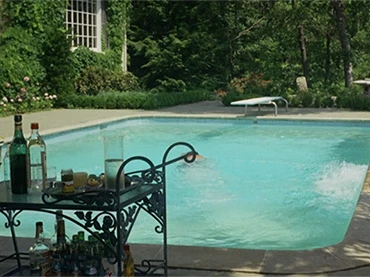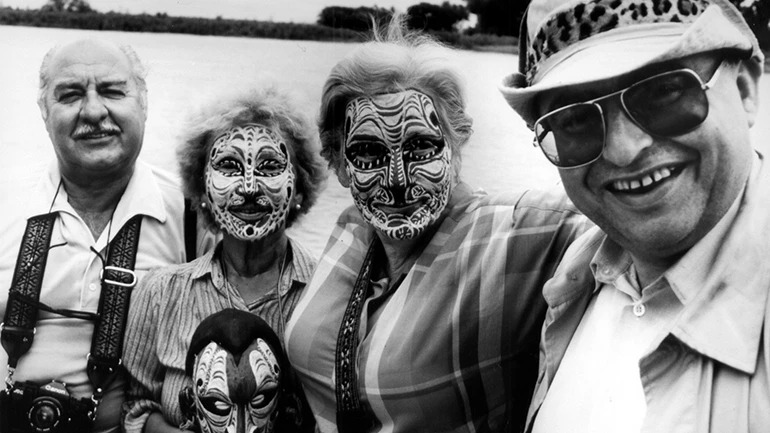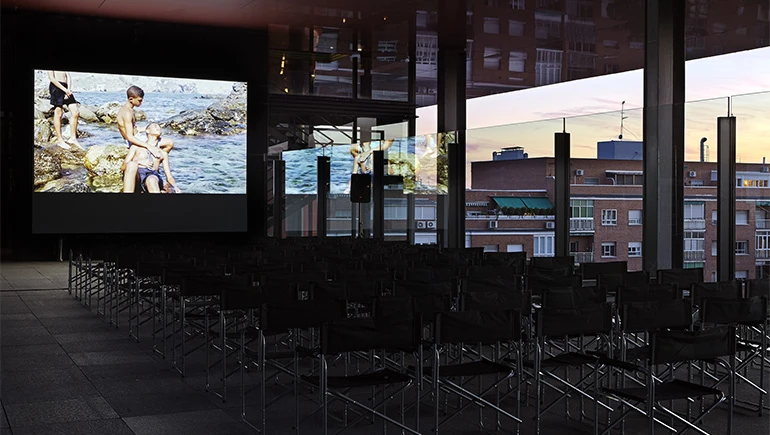-
July 15th, 2016
The Lumière brothers
La Sortie de l’usine Lumière à Lyon [Workers Leaving the Lumière Factory, 3rd version], 1895.
Original version, b/w, 42’Jean Vigo
À propos de Nice [Apropos of Nice], 1930
Original version, b/w, 23’Manoel de Oliveira
Nice: À propos de Jean Vigo [Nice: Apropos of Jean Vigo], 1983
Original version, color, 58’The tension and progressive contamination between leisure and work appeared in the founding images of film: La Sortie de l'usine Lumière constitutes theatrical expression, whereby workers stage a fictitious working day on their day off. Vigo approached this quandary by revealing the social and class implications – using the holiday city of Nice, he traced an ill-tempered critique of the new leisure class: the tourist. Fifty-three years on, and as an homage, de Oliveira returned to Nice to add new realities to this complex binomial.

-
July 16th, 2016
Jacques Tati
Les vacances de Monsieur Hulot [Monsieur Hulot’s Holiday], 1953
Original version, b/w, 95’By way of his on-screen alter ego, Monsieur Hulot, Tati conveys the pretence and paradoxes in the new tourist class that emerged after the legal acknowledgement of paid holidays. Tourism is presented as machine-like and automated fun i.e. a job: having fun and showing it verifies that the promise held at the beginning of the holiday is seen through.

-
July 22nd, 2016
Dino Risi
Il sorpasso [The Easy Life], 1962
Original Version, b/w, 105’Shot during the years of “economic miracle” in Italy, Il sorpasso tells the frenetic story of two seemingly incompatible characters on a madcap trip at the height of the summer holiday season. A timid law student and a hedonistic scrounger, reflections of social dilemmas in Italy, aimlessly travel the country in style.

-
July 23rd, 2016
Jean-Luc Godard
Week-end, 1967
Original version, color, 105’Filmed a year before May ‘68, Week-end is a type of premonition with which Godard captured the end of an era. The film provides an acerbic description of the nascent consumer society via one of its most prized objects: the car, a symbol of the status, social class, climbing and influence of a whole economic and political system.

-
July 29th, 2016
Josep María Forn
La piel quemada (Burnt Skin), 1967
Original version, b/w, 110’To whom does burnt skin belong? Who is burnt by the sun? Setting out from these questions, Forn focuses on the location of Lloret de Mar, a town undergoing major transformation with the development of tourism. In this town the needs and desires of immigrants, predominantly from Andalusia, are accommodated as they seek employment; the new tourist class and the locals, all under the same blazing sun.
Acknowledgements: Filmoteca de Catalunya (Catalonia Film Institute).

-
July 30th, 2016
Frank Perry
The Swimmer, 1968
Original version, color, 95’Adapted from John Cheever’s short story under the same name, The Swimmer portrays the disillusionment, cynicism and decay of the middle and upper class. One day, at the end of summer, Merrill decides to return home by swimming through all the pools in the neighbourhood, thus creating a fictitious river that will progressively take him further away from his goal and the idea of home, and in the process question something deeper: the American dream.

-
August 5th, 2016
Jim Jarmusch
Permanent Vacation, 1980
Original version, color, 76’The title of the New York director’s first film refers to the slangy and sarcastic sense of the term layoffs, or collective dismissals. The “vacation” in the title does not allude to free time but rather the time spent over the course of a day by an urban bohemian, a new kind of forced leisure class that becomes alienated in a de-industrialised urban space and finds it impossible to communicate with one another and with the world they have been thrown out of.

-
August 6th, 2016
Raoul Ruiz
O território [The Territory], 1981
Original version, color, 104’From a ritualistic and perverse perspective, O território addresses the unavoidable relationship that exists between tourism and cannibalism, between civilisation and brutality. It is the extreme side of a self-cannibalising tourism, an allegorical display of the tourist finding it impossible to explore and get to know the limits of the territory they are visiting and which, on occasions, proves too much for them.

-
August 12th, 2016
Dennis O’Rourke
Cannibal Tours, 1988
Original version, color, 67’“There’s nothing so strange, in a strange land, as the stranger who comes to visit it” is the quote that opens this film, which is shot during an excursion to an island inhabited by an ancient tribe of cannibals who are now caught up in producing handicrafts for tourists. This is a key landmark for understanding the complex web on which the tourist industry is built and based, feeding off and nurtured by the desire to discover something original, hidden and paradisiacal.

-
August 13th, 2016
José Luis Torres Leiva
Verano [Summer], 2011
Original version, color, 95’An homage to intimate and family holiday films, where distraction gradually becomes a yearning for lost time. The director turns “amateurism” and improvisation into an experimental cinematic reflection; shot in 16 and 35 mm film, the film-maker projects the movie onto a wall and films it again. The recording is the final result: falling between the simplicity of Eric Rohmer and the complexity of experimental cinema.

-
August 19th, 2016
Narimane Mari
Loubia Hamra [Bloody Beans], 2013
Original version, color, 77’Presentation by the director of the film together with Elena Oroz
Made in Algeria as the country celebrates fifty years of independence, Loubia Hamra approaches another of the seductive images of summer by definition: the beach. Yet it does so by subverting Western iconography as a symbolic place of rest, exploring it as a space crossed by the trauma of recent history.

-
August 20th, 2016
Ion de Sosa
Sueñan los androides [Androids Dream], 2014
VO, color, 61’Set in the futuristic apex of Spanish developmentalism, in Benidorm in 2052, and shot across three Octobers between 2010 and 2014, in this film the ideas that intersect the series are upheld: the transformation and annihilation of space, the influence of the subject-tourist in the territory, the undercurrent of speculation as a driving force of seasonal cities and the world as a huge stage for global tourists, condemned to live without either work or rest. A grotesque, deformed and ascetic version of a devastated present: post-crisis Spain.


Frank Perry. The Swimmer. Film, 1968
Held on 15, 16, 22, 23, 29, 30 Jul, 05, 06, 12, 13, 19, 20 Aug 2016
The open-air cinema is closely linked to summer holidays: a space and time where the working class is freed from work obligations and where the chance for enjoyment and leisure presents itself. Setting out from the concurrence between Thorstein Veblen’s book The Theory of the Leisure Class, published in 1899, and the birth of cinema via Workers Leaving The Lumière Factory, the Lumière brothers’ 1895 film, this series, screened on the outdoor terraces of the Museo, offers a journey through the history of the medium, focusing on its relationship with the conception of holidaying, leisure, travel and tourism, through which a whole range of ideas and questions that surface at this intersection are analysed. In other words: the consolidation of a working class freed from work and embodied in the display of social status; the working-class conquest of paid holidays, with the subsequent division between work and unproductive time; or the ensuing appearance of mass tourism at the heart of the social, cultural, economic and even landscape transformations that gave rise to the appearance of the subject-tourist, motivated by the desire to seek different but at the same time identical and uniform experiences. The working-class dream of a permanent vacation, aspiration or condemnation?
Curatorship
Gonzalo de Pedro and Chema González






Más actividades

Aesthetics of Peace and Desertion Tactics
8 October 2025 – 24 June 2026
The study group Aesthetics of Peace and Tactics of Desertion: Prefiguring New Pacifisms and Forms of Transitional Justice proposes a rethinking—through both a theoretical-critical and historical-artistic lens—of the intricate network of concepts and practices operating under the notion of pacifism. A term not without contestation and critical tension, pacifism gathers under its name a multiplicity of practices—from anti-militarism and anti-war movements to non-violence activism—while simultaneously opening urgent debates around violence, justice, reparation, and desertion. Here, pacifism is not conceived as a moral doctrine, but as an active form of ethical and political resistance capable of generating aesthetic languages and new positions of social imagination.
Through collective study, the group seeks to update critical debates surrounding the use of violence and non-violence, as well as to explore the conflict of their representation at the core of visual cultures. In a present marked by rearmament, war, genocide, and the collapse of the social contract, this group aims to equip itself with tools to, on one hand, map genealogies and aesthetics of peace—within and beyond the Spanish context—and, on the other, analyze strategies of pacification that have served to neutralize the critical power of peace struggles. Transitional and anti-punitive justice proposals will also be addressed, alongside their intersections with artistic, visual, and cinematic practices. This includes examining historical examples of tribunals and paralegal activisms initiated by artists, and projects where gestures, imaginaries, and vocabularies tied to justice, reparation, memory, and mourning are developed.
It is also crucial to note that the study programme is grounded in ongoing reflection around tactics and concepts drawn, among others, from contemporary and radical Black thought—such as flight, exodus, abolitionism, desertion, and refusal. In other words, strategies and ideas that articulate ways of withdrawing from the mandates of institutions or violent paradigms that must be abandoned or dismantled. From feminist, internationalist, and decolonial perspectives, these concepts have nourished cultural coalitions and positions whose recovery today is urgent in order to prefigure a new pacifism: generative, transformative, and radical.
Aesthetics of Peace and Tactics of Desertion, developed and led by the Museo Reina Sofía’s Studies Management, unfolds through biweekly sessions from October to June. These sessions alternate between theoretical discussions, screenings, work with artworks and archival materials from the Museo’s Collection, reading workshops, and public sessions. The group is structured around sustained methodologies of study, close reading, and collective discussion of thinkers such as Judith Butler, Elsa Dorlin, Juan Albarrán, Rita Segato, Sven Lütticken, Ruth Wilson Gilmore, and Franco “Bifo” Berardi; historical episodes such as the anti-nuclear and anti-arms race movement in Spain; and the work of artists and activists including Rojava Film Commune, Manuel Correa and the Oficina de Investigación Documental (Office for Documentary Investigation), and Jonas Staal, among other initial cases that will expand as the group progresses.

Institutional Decentralisation
Thursday, 21 May 2026 – 5:30pm
This series is organised by equipoMotor, a group of teenagers, young people and older people who have participated in the Museo Reina Sofía’s previous community education projects, and is structured around four themed blocks that pivot on the monstrous.
This fourth and final session centres on films that take the museum away from its axis and make it gaze from the edges. Pieces that work with that which is normally left out: peripheral territories, unpolished aesthetics, clumsy gestures full of intent. Instead of possessing an institutional lustre, here they are rough, precarious and strange in appearance, legitimate forms of making and showing culture. The idea is to think about what happens when central authority is displaced, when the ugly and the uncomfortable are not hidden, when they are recognised as part of the commons. Film that does not seek to be to one’s liking, but to open space and allow other ways of seeing and inhabiting the museum to enter stage.

Intergenerationality
Thursday, 9 April 2026 – 5:30pm
This series is organised by equipoMotor, a group of teenagers, young people and older people who have participated in the Museo Reina Sofía’s previous community education projects, and is structured around four themed blocks that pivot on the monstrous.
The third session gazes at film as a place from which to dismantle the idea of one sole history and one sole time. From a decolonial and queer perspective, it explores films which break the straight line of past-present-future, which mix memories, slow progress and leave space for rhythms which customarily make no room for official accounts. Here the images open cracks through which bodies, voices and affects appear, disrupting archive and questioning who narrates, and from where and for whom. The proposal is at once simple and ambitious: use film to imagine other modes of remembering, belonging and projecting futures we have not yet been able to live.

Remedios Zafra
Thursday March 19, 2026 - 19:00 h
The José Luis Brea Chair, dedicated to reflecting on the image and the epistemology of visuality in contemporary culture, opens its program with an inaugural lecture by essayist and thinker Remedios Zafra.
“That the contemporary antifeminist upsurge is constructed as an anti-intellectual drive is no coincidence; the two feed into one another. To advance a reactionary discourse that defends inequality, it is necessary to challenge gender studies and gender-equality policies, but also to devalue the very foundations of knowledge in which these have been most intensely developed over recent decades—while also undermining their institutional support: universities, art and research centers, and academic culture.
Feminism has been deeply linked to the affirmation of the most committed humanist thought. Periods of enlightenment and moments of transition toward more just social forms—sustained by education—have been when feminist demands have emerged most strongly. Awareness and achievements in equality increase when education plays a leading social role; thus, devaluing intellectual work also contributes to harming feminism, and vice versa, insofar as the bond between knowledge and feminism is not only conceptual and historical, but also intimate and political.
Today, antifeminism is used globally as the symbolic adhesive of far-right movements, in parallel with the devaluation of forms of knowledge emerging from the university and from science—mistreated by hoaxes and disinformation on social networks and through the spectacularization of life mediated by screens. These are consequences bound up with the primacy of a scopic value that for some time has been denigrating thought and positioning what is most seen as what is most valuable within the normalized mediation of technology. This inertia coexists with techno-libertarian proclamations that reactivate a patriarchy that uses the resentment of many men as a seductive and cohesive force to preserve and inflame privileges in the new world as techno-scenario.
This lecture will address this epochal context, delving into the synchronicity of these upsurges through an additional parallel between forms of patriarchal domination and techno-labor domination. A parallel in which feminism and intellectual work are both being harmed, while also sending signals that in both lie emancipatory responses to today’s reactionary turns and the neutralization of critique. This consonance would also speak to how the perverse patriarchal basis that turns women into sustainers of their own subordination finds its equivalent in the encouraged self-exploitation of cultural workers; in the legitimation of affective capital and symbolic capital as sufficient forms of payment; in the blurring of boundaries between life and work and in domestic isolation; or in the pressure to please and comply as an extended patriarchal form—today linked to the feigned enthusiasm of precarious workers, but also to technological adulation. In response to possible resistance and intellectual action, patriarchy has associated feminists with a future foretold as unhappy for them, equating “thought and consciousness” with unhappiness—where these have in fact been (and continue to be) levers of autonomy and emancipation.”
— Remedios Zafra

27th Contemporary Art Conservation Conference
Wednesday, 4, and Thursday, 5 March 2026
The 27th Contemporary Art Conservation Conference, organised by the Museo Reina Sofía’s Department of Conservation and Restoration, with the sponsorship of the Mapfre Foundation, is held on 4 and 5 March 2026. This international encounter sets out to share and debate experience and research, open new channels of study and reflect on conservation and the professional practice of restorers.
This edition will be held with in-person and online attendance formats, occurring simultaneously, via twenty-minute interventions followed by a five-minute Q&A.